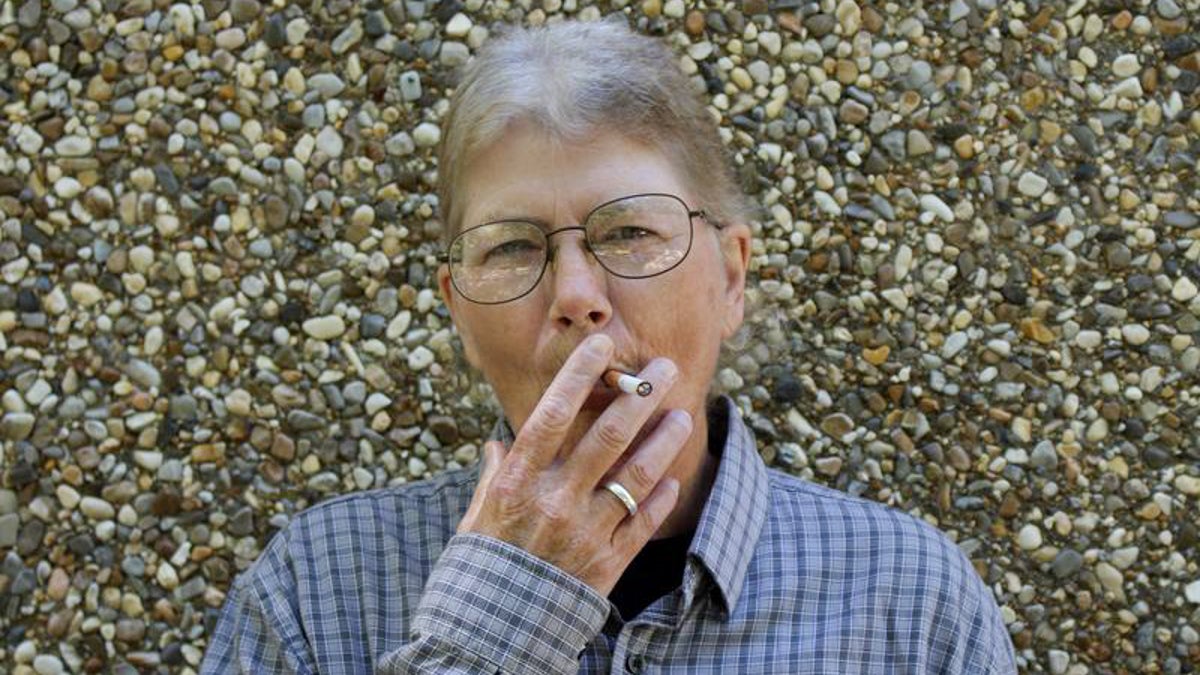Smoking is often the hardest ‘vice’ to quit
Listen
April Anderson is trying to quit smoking after forty years. She's HIV positive, which means the negative health effects of smoking are even greater her. (Morgan Springer/for WHYY)
Public health experts say: Ditch your smokes. And if you have HIV, there are a few extra reasons to kick the habit soon.
At 53 years old, April Anderson is HIV-positive and trying to quit smoking tobacco. She started when she was a kid, “ever since I could sneak cigarettes from my mom and dad.”
She was 10 years old. By age 12, she’d gotten comfortable and was smoking in front of her parents. They didn’t mind.
April says she was a chain smoker and couldn’t go anywhere without a cigarette. Even indoors where she couldn’t smoke, she’d have one dangling unlit from her mouth.
“Smoking used to be cool,” April says. “That’s the way they used to advertise it on TV … Marlboros were it. You know, Raleighs. Kools. Salems.”
April says now it’s just not cool.
“People look at you, and they’re just kind of like ‘ew,'” she says.
Smoking tobacco is bad for your health. Most people know that, April included. April wants to quit. And the Centers for Disease Control and Prevention says 68 percent of American smokers want to kick the habit too.
April has tried a number of times. Once she quit cold turkey — without any help. That lasted two days.
“[Addiction is] like having to go pee so bad that you can’t hold it,” April says, “and you’re doing that pee-pee dance.”
She says you make that feeling go away by having a cigarette. That’s what April did again last year after being smoke-free for around eight months.
April was diagnosed HIV-positive in 2002. Shortly after that, she started getting help from Munson Medical Center’s Thomas Judd Care Center in Traverse City, Michigan. The center provides services for people with HIV and AIDS. Victoria Cammarata, the complex care coordinator at the center, helps patients that want to quit smoking. But some people don’t want help.
“Those that don’t want to quit, really don’t want to quit,” says Cammarata. “They’re like, ‘It’s my last vice,’ and are very firm with it.”
Smoking can feel like a necessary comfort after you’ve given up drugs or stopped drinking and, on top of that, had to make all sorts of adjustments to live well with HIV. April has had to make all those life changes over the years.
Roughly 15 percent of American adults smoke. But the rate is much higher for people with HIV. In Michigan, 50 percent of people living with HIV smoke. Cammarata says that’s because people with HIV often fall into three groups that have higher smoking rates than the general population. The groups are people who identify as LGBTQ, substance abusers, and people who deal with mental health problems.
People with HIV live longer now than before, but Cammarata says the disease is hard on the body.
“Basically it intensifies the disease process,” she says. “So anything that would happen to a normal person with aging happens quicker with HIV, and then when you smoke on top of that, it happens even faster.”
It takes smokers — on average — more than five attempts to quit. April says she’s down from 40 cigarettes a day to eight cigarettes. She has a few quitting tricks up her sleeve: Only bring some cigarettes in the pack with her to work; smoke half a cigarette instead of a whole; wait an extra half-hour before having the next cigarette.
“If I don’t focus on it, it’s ok,” she says. “It doesn’t drive me nuts … but if I’m just sitting at home doing nothing … It drives me nuts. I just sit there and focus on it. ‘I want to smoke a cigarette. I want to smoke a cigarette. I want a cigarette.'”
April smokes Basic Reds, which cost $7.60 a pack — more incentive to quit.
“Come on,” she says. “I can save that money and take a trip to Florida and see my granddaughter.”
But April also enjoys smoking.
“I like to have that cigarette after dinner,” she says. “I like to sit around my porch and kick back and have a cigarette.”
She feels relaxed when she smokes.
“Just kind of chilled,” she says.
April has a couple of things motivating her to quit. Her friends. Her family — particularly her granddaughter. Her goal is to be done with cigarettes by Christmas.
WHYY is your source for fact-based, in-depth journalism and information. As a nonprofit organization, we rely on financial support from readers like you. Please give today.






